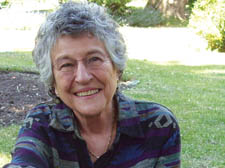|
|
 |
| |
 Irma Kurtz: ‘Curious about people’s lives and very bossy’ Irma Kurtz: ‘Curious about people’s lives and very bossy’ |
‘Money has replaced honour and imagination’
For writer and Cosmopolitan
agony aunt Irma Kurtz, growing old is easier to accept than the loss of ideals
in society, writes Peter Gruner
About Time: Growing Old Disgracefully.
By Irma Kurtz,John Murray
IT was one of the questions I had to ask agony aunt and writer Irma Kurtz. Would she be interested in standing as an independent MP?
With her sound common sense and years of dealing with tricky problems, surely she would be an ideal candidate in the wake of the parliamentary expenses scandal.
But Irma, who is 73 and has just published a new book, is quite clear: “I’m not a political animal. I’m independent in every sense. I’m also inclined to change my mind, which is not a good thing for an MP.”
Her book, About Time: Growing Old Disgracefully, is a fascinating and funny collection of essays about ageing and its effect.
Interviewees include Rose Hacker – dubbed the world’s oldest columnist – who wrote exclusively for the Camden New Journal until she died last year, and Norman Balon, retired landlord of Soho’s Coach and Horses pub and still “grumpy” after all these years.
Pondering the political question, Irma told me public office for the ancient Greeks was an honour, and public representatives were paid in kind.
“Wouldn’t that be good for our MPs? We could take care of them, make them comfortable but there would be no money involved,” she said.
She hates the loss of ideals in all walks of life. “I’m not sure that those who are throwing stones at our MPs wouldn’t have done the same in their position,” she said. “I don’t like the way money has become the most important thing in our lives. It has replaced honour and love and it has replaced imagination.”
After more than 20 years in her beloved Soho, she moved to Bloomsbury and now occupies a seventh-floor flat in Gray’s Inn Road with a wonderful view of the capital.
“I miss Soho as it was, not as it is,” she said. “It has always been sleazy and that’s OK, but it has lost its bohemian side and its poetry. The Colony Room has closed. It was the last of the great after-hours clubs, where I remember standing with Francis Bacon on one side and Jeff Bernard, the late Spectator columnist, on the other.”
Irma has always “followed bohemia”, but the culture is difficult to find these days.
“The naughtiness that made Soho special is everywhere now. And vice has become a lot nastier. In today’s Soho there are unhappy, frightened young women, many of whom I suspect didn’t know they were being exported for the sex trade.”
American-born, as a young woman Irma went to Columbia University in New York. She hung out in the West Village because that was where the poets and painters lived.
“I watched Dylan Thomas get drunk in a bar there one day,” she said. “Later I fell in love with Paris, the West Bank, which is also not the way it used to be.”
She adores Bloomsbury today because it still has its quaintness and she can walk to the West End, the South Bank or to Islington’s Almeida and King’s Head theatres.
She visits local pubs and restaurants and enjoys investigating the history of local streets. “I’ve been in Bloomsbury for only two years but I feel very much at home,” she said.
She has been agony aunt for Cosmopolitan magazine for 36 years. What makes her good at the job?
“Being very curious about people’s lives and very bossy. I always think I know what’s right. I myself don’t take advice very well unless it comes from a doctor, and even then I question it and get a second opinion.”
As for being old, she says it
is what you make of it. “A lot of women complain about becoming invisible,” she said. “But I have found that a delight. I can watch the ongoing story of the world around me. It’s fun and nobody is sizing you up.”
One of her few unfulfilled ambitions is to write a new travel book. “I’m a traveller by nature,” she said, “and my favourite book of all those I have written is The Great American Bus Ride, about travelling across America on Greyhound buses.”
The mother of a film-maker son, and now also a grandmother, Irma seems fulfilled; but she does have one great disappointment in life.
“I believed in love,” she admits. “My generation did. We went to black and white movies and they ended with a great kiss. I remember when I realised that it was not going to happen and I was sad about it. I really thought I’d meet the man, the man.
“I didn’t care about whether I’d marry him but I thought I’d meet my soul mate.
“I find most women of my generation who are on their own now thought that one day they would meet their soul mate. And an awful lot of us didn’t – especially us adventurous types.”
? |
 |
|
 |
 |
|
 |
|
 Irma Kurtz: ‘Curious about people’s lives and very bossy’
Irma Kurtz: ‘Curious about people’s lives and very bossy’
